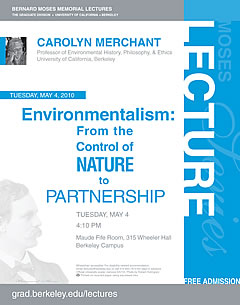
Carolyn Merchant
Professor of Environmental History, Philosophy, and Ethics, University of California, Berkeley
Bernard Moses Memorial Lecture
May 4, 2010 — 4:10 PMMaude Fife Room — 315 Wheeler Hall, Berkeley Campus
About The Lecture In the Scientific Revolution of the 17th century, when environmental awareness over loss of forests and depletion of soils was in its infancy, the long term goal of the betterment of humankind through the control of nature … Continued
Maude Fife Room - 315 Wheeler Hall, Berkeley Campus Berkeley Graduate Lectures [email protected] false MM/DD/YYYYAbout The Lecture
In the Scientific Revolution of the 17th century, when environmental awareness over loss of forests and depletion of soils was in its infancy, the long term goal of the betterment of humankind through the control of nature was a significant advancement. The experimental vision put forward by Francis Bacon and others enabled humanity to understand science and manage nature. For the 21st century, however, the ethic of control is giving way to one of partnership with the natural world. A partnership ethic entails a viable, sustainable relationship in which connections to the global world are recognized through science, technology, and ecological exchanges. It is an ethic in which humans act to fulfill both humanity’s vital needs and nature’s needs while restraining human hubris.
About Carolyn Merchant
Carolyn Merchant is renowned for her important contributions to the study of environmental history and the history of science. Merchant is most famous for her theory of ‘The Death of Nature.’ In her book of the same title, she identifies the Scientific Revolution as the period when the study of science began to sanction the exploitation of nature and commercial expansion. Furthermore, Merchant shows how the mechanistic view of modern science plus the destruction of the environment promotes a new socioeconomic order that subordinates women. Her current research focuses on the development of natural resources within the environmental history of the United States and California aiming to explore conservation and reassess destructive policies.
In addition to The Death of Nature: Women, Ecology, and the Scientific Revolution (1980), Merchant has authored numerous books, including Ecological Revolutions: Nature, Gender, and Science in New England (1989); Radical Ecology: The Search for a Livable World (1992); Earthcare: Women and the Environment (1996); The Columbia Guide to American Environmental History(2002); and Reinventing Eden: The Fate of Nature in Western Culture (2003), as well as many articles on the history of science, environmental history, and women and the environment.